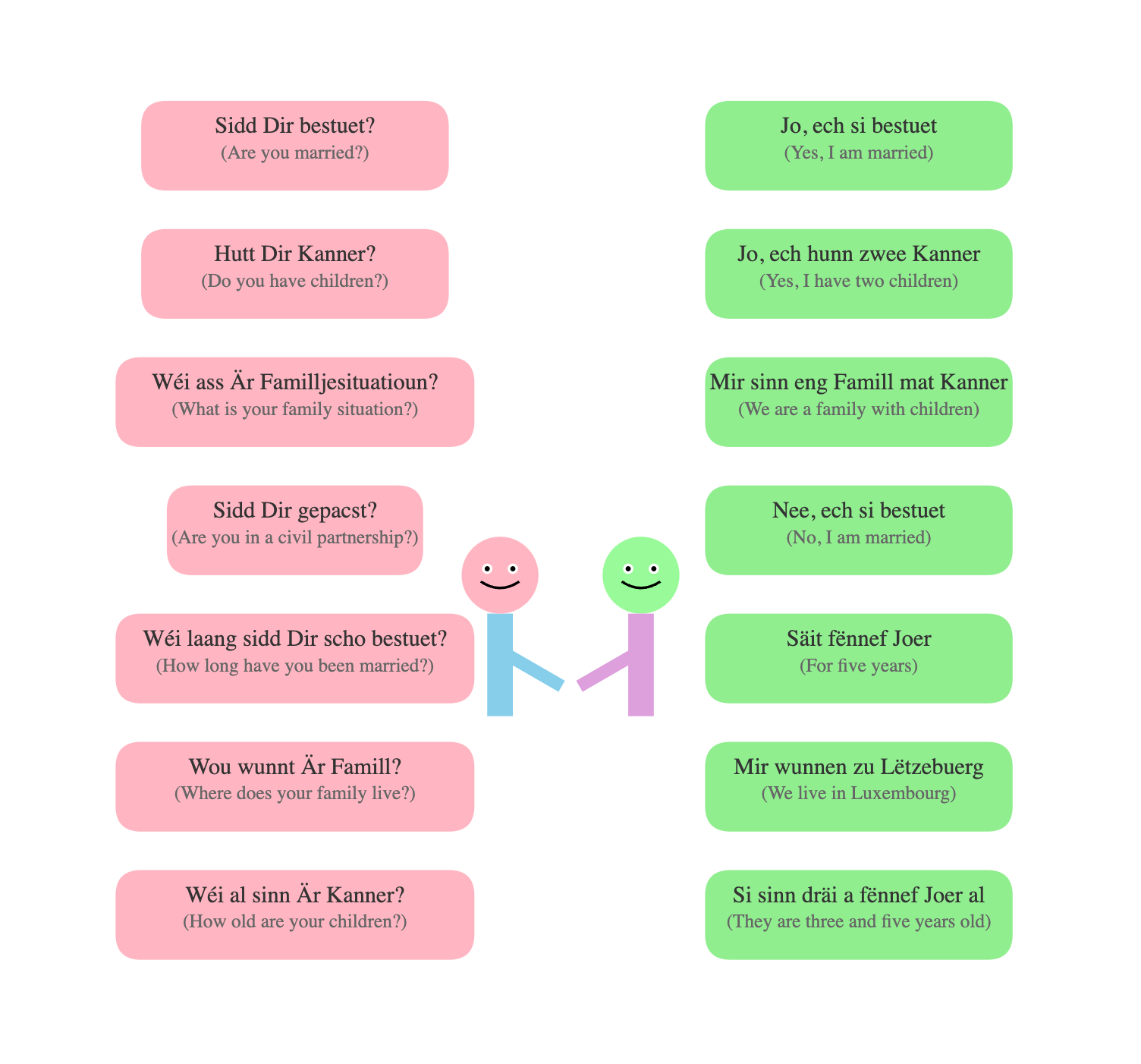Luxembourgish A1 : Class 9 📚
1. Family Status & Personal Information
Basic Questions and Answers
| Formal | Informal | Answer |
|---|---|---|
| Sidd Dir bestuet? | Bass du bestuet? | Jo, ech si bestuet. / Nee, ech sinn net bestuet. |
| Hutt Dir Kanner? | Hues du Kanner? | Jo, ech hunn ee Kand. / Jo, ech hunn zwee Kanner. |
| Wéi ass Är Nummer? | Wéi ass deng Nummer? | Meng Nummer ass… |
| Wéini sidd Dir gebuer? | Wéini bass du gebuer? | Ech sinn den … gebuer. |
Marriage Status Terms
- bestuet - married (traditional marriage)
- gepacst - in civil partnership (PACS)
- gescheet - divorced
- Wittmann/Wittfra - widower/widow
- Jonggesell - bachelor
- single - single
- Bezéiung - relationship
Family Members
- Meedchen - girl/daughter
- Duechter - daughter
- Bouf - son
- Kanner - children

2. The N-Rule (D’N-Regel) 📝
Basic Rules
Keep the final ‘n’ or ‘nn’ when the next word starts with:
- DHNTZ:
- Dësch, Hond, Noper, Toast, Zuch
- Vowels (AEIOU):
- Auto, Ee, Iesel, Owend, Ufank
Memory Aid: “UNITED ZOAH”
- Ufank (beginning)
- Noper (neighbor)
- Iesel (donkey)
- Toast (toast)
- Ee (egg)
- Dësch (table)
- Zuch (train)
- Owend (evening)
- Auto (car)
- Hond (dog)
Special Cases
- End of sentence/line: Keep ‘n’
- Net fëmmen!
- Moien.
- Before punctuation: Keep ‘n’
- Du solls direkt ophalen!
- Fixed exceptions:
- de Mann
- d’Sonn
- Maschin
3. Verb Conjugations 🔄
Regular Verb: wunnen (to live)
| Person | Form | Example |
|---|---|---|
| ech | wunn-en | Ech wunnen zu Esch. |
| du | wunn-s | Du wunns a Frankräich. |
| hien/si/hatt | wunn-t | Hien wunnt an Däitschland. |
| mir | wunn-en | Mir wunnen zu Lëtzebuerg. |
| dir/Dir | wunn-t | Dir wunnt an der Stad. |
| si | wunn-en | Si wunnen am Ausland. |
Common Irregular Verbs
sinn (to be)
- ech sinn
- du bass
- hien/si/hatt ass
- mir sinn
- dir/Dir sidd
- si sinn
hunn (to have)
- ech hunn
- du hues
- hien/si/hatt huet
- mir hunn
- dir/Dir hutt
- si hunn
4. Important Vocabulary 📖
Colors
- mof - purple/pink
- gro - grey
- rout - red
Places
- Wunnuert - place of residence
- am Ausland - abroad
- Arel - Arlon
- d’Stad - the city
Actions
- geplënnert - moved
- umellen - to register
- brauchen - to need
- wëllen - to want
5. Useful Phrases for Practice 💭
At the Bierger-Center
A: Bonjour Madamm, wéi kann ech Iech hëllefen?
B: Gudde Moien, ech si geplënnert an ech wëll mech hei an der Stad umellen.
A: Wéi ass Ären Numm?
B: Sandy Winandy.
A: Äre Gebuertsdag, wannechgelift?
B: Ech sinn de 15. Januar 1974 gebuer.
Common Expressions
- Ech sinn an enger Bezéiung - I am in a relationship
- Ech hunn keng Kanner - I don’t have any children
- Ech wunnen zu Lëtzebuerg - I live in Luxembourg
- Ech si geplënnert - I have moved
6. Practice Tips 💡
N-Rule Practice:
- Read texts aloud, focusing on n-deletion
- Practice with simple phrases first
- Listen to native speakers
Verb Conjugations:
- Practice with different subjects
- Mix formal and informal forms
- Create your own sentences
Vocabulary Building:
- Group words by themes
- Create flashcards
- Use words in context
Dialog Practice:
- Role-play the Bierger-Center dialog
- Create variations with different information
- Practice both formal and informal versions
7. Cultural Notes 🏰
- The Bierger-Center is where residents register their address
- PACS (civil partnership) is an alternative to traditional marriage
- Always use formal language (Dir) with officials
- Registration is required when moving to a new address
8. Homework Suggestions 📝
Write a short paragraph about:
- Your family status
- Where you live
- Your work/studies
- Your hobbies
Practice the N-Rule by:
- Writing 10 sentences using different cases
- Reading them aloud
- Recording yourself speaking
Create dialogs for:
- Meeting new people
- At the Bierger-Center
- Talking about family
Remember: Regular practice and immersion are key to mastering these concepts! 🌟